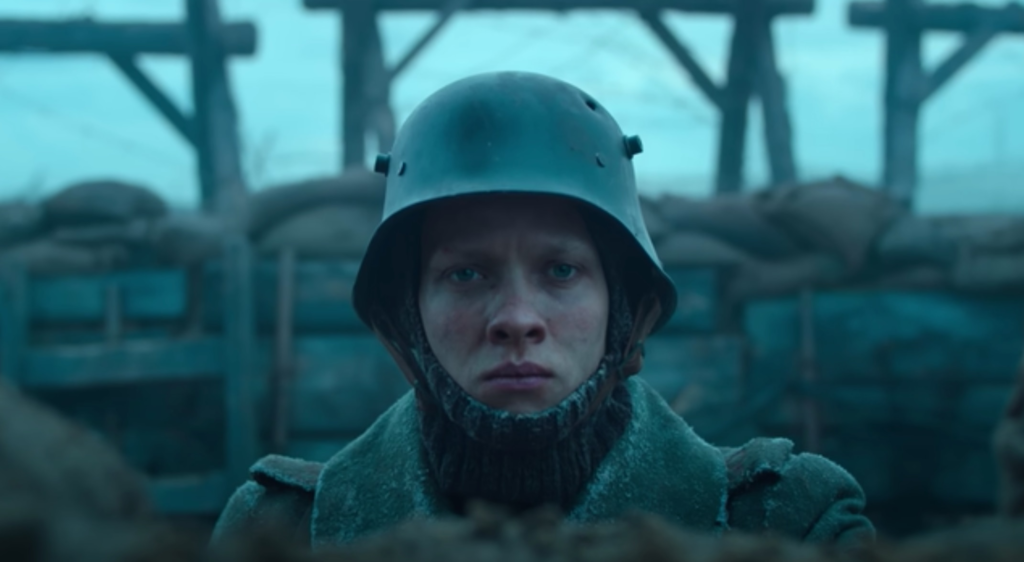The Oscar nominee for Best Picture “All Quiet on the Western Front” is a war movie that detests war.
Unlike the scores of films that use gruesome conflict as a storytelling exercise in which good defeats evil and boys become men, Edward Berger’s 2022 German-language film seeks to hammer home one point: War is not an adventure.
“This is 100 percent an anti-war movie, because like the book, it doesn’t glorify war. Rather, it shows the mass destruction as a result,” screenwriter Ian Stokell told Military Times. “In my eyes, at its core, it’s not about politics or nationalism or history — it’s a story about the everyman. It’s ordinary men, placed in horrific situations, doing extraordinary things, just trying to survive the next 10 minutes.”
The result, the third adaptation of Erich Maria Remarque’s 1929 novel of the same name, is an incredibly sobering reflection of war when compared to the year’s other most prominent military film, “Top Gun: Maverick,” which was also nominated for best picture. The first adaptation, made in 1930, took home the Oscar for Best Picture. That was followed by a 1979 made-for-TV version.
The opening of Berger’s film is monotonous, which makes the beginning sequence all the more chilling. By the time we meet our protagonist Paul (Ian Kemmerer), catastrophic loss of life for the German war machine is practically minutiae. Viewers see boys — excited to join the Army — donning recycled uniforms that belonged to soldiers who soaked them in blood just days earlier. Prospects celebrate shipping off to combat, having no idea the terrible fate that awaits.
“Remarque’s position on war is not so much one of saying, who was right, who was wrong,” producer Malte Grunert said. “It’s that war is, for the ones that survive it, such a life changing experience, that it’s nothing that should be entered into lightly.”
And while the opening of the 2022 film feels true to Remarque’s story, the political goings-on woven into the backdrop are a significant diversion, with Stokell and fellow screenwriter Lesley Paterson choosing to highlight the Allied demands during the negotiation of the 1918 Armistice, which some argue played a role in setting the stage for the Second World War approximately 20 years later.
According to Stokell, that deviation stemmed from the desire to focus more on ideals instead of translating the novel word-for-word.
“We wanted to add something that was unavailable to Remarque when he wrote it, and that was the theme of historical context, which is why we added the entire armistice negotiations and the railway carriages storyline in the original screenplay we wrote in 2007,” Stokell said.
Now, after 16 years of work, an Academy nomination for Best Picture is validation, Stokell said.
“It’s a fantastic achievement and recognition of all the amazing people that worked on the film,” he said. “It is also a validation of Lesley and my decision to option the rights to the novel in 2006 and write the screenplay, and of Edward’s significant contributions to the script and vision to tell it from the German perspective.”
Stokell also believes current world events have made the release of this movie all the more poignant. Even after a hundred years, Europe has not figured out how to stop fighting trench wars, Stokell said of the Russian invasion of Ukraine.
“The fact that the film had its world premiere in 2022, the year of the beginning of the greatest military conflict in Europe since the Second World War, was both hugely unfortunate, but perhaps also a reflection of a modern world lacking in effective diplomacy,” he said. “The timing of current events absolutely led to the film feeling, sadly, more relevant than we ever anticipated.”
Observation Post is the Military Times one-stop shop for all things off-duty. Stories may reflect author observations.
Sarah Sicard is a Senior Editor with Military Times. She previously served as the Digitial Editor of Military Times and the Army Times Editor. Other work can be found at National Defense Magazine, Task & Purpose, and Defense News.
